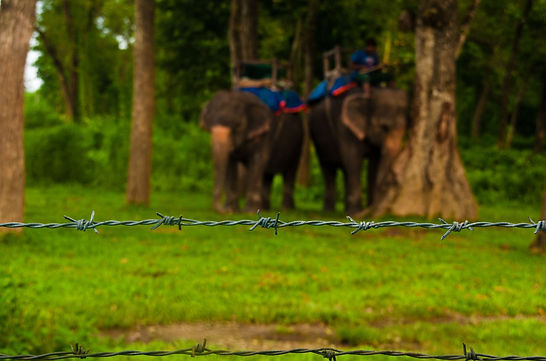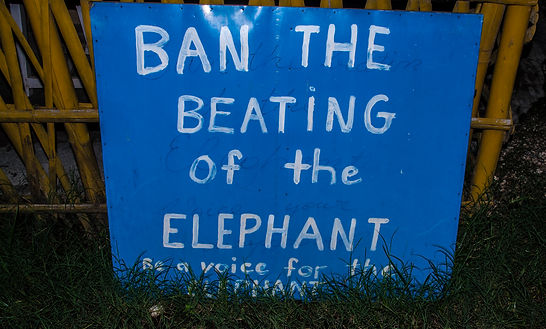top of page
Travelling Light
Elephant Safari,
Nepal
Sarah Zacharek
The flat plains of the Terai region are a stark contrast to the Himalayan views for which Nepal is so famous, but a trip to Chitwan National Park is a must for any visit to the country.
Tourists in their thousands flock here in the hopes of catching a glimpse of the rhinos, Bengal tigers, leopards, crocodiles and deer that reside in the UNESCO Natural Heritage Site. Arguably the biggest draw for many is the promise of the elephant jungle safari, an activity which on prior visits to the area I have taken part in, without second thought, assuming that this was a safe and ethical way for the locals to make their money. This time I arrived with a different agenda; I wanted to explore the jungle on foot and find out just what the elephants endure in order to keep the tourist rupees flowing in.
Firstly I should point out that the elephant is not the only means of exploring the park. A 5 hour safari into the heart of the jungle in an old world war 2 vehicle can be just as thrilling when it fails to start just as a wild elephant spots you and decides to charge. Similarly, stumbling across a rhino on foot is pretty hair raising, especially when your guide has just advised you that the best thing to do in such a situation is to walk slowly backwards and then up the nearest tree. Yikes! Finally there is the option of an early morning ride in a traditional wooden canoe where your guide will point out different species of bird, monkey and crocodile.
This particular trip was my fourth visit to Chitwan in 7 years. Each experience has been different but this one was by far my favourite. On the first day we met our guide, a happy and pleasant man in his late thirties. He took us for a walk to the elephant breeding centre to see first hand how the elephants are treated prior to being trained. Although they seem pretty well looked after you can't help but notice that they can't wander far as they are chained by their feet. Our guide took us to the visitor centre; a dank, seemingly overlooked room with an elephant skull on display in the middle. On the walls were posters detailing how the elephants are trained. This was the confirmation I had been looking for, not hidden from tourists but displayed rather proudly for those who take the time to seek the information. The posters detailed the types of tools used in training the elephants, the way they are taken from their mothers at a young age, exposed to fire and loud noises and finally how they are controlled with hooks and sticks for the benefit of tourists. Far too often these tools cause painful wounds, evident in the form of telltale scars across the elephant's head and neck.
The following day I was scheduled to partake in the elephant safari. I trundled in the back of a jeep with 7 other tourists and travelled for 10 minutes to the outskirts of the park. Our driver, Krishna, didn't seem to understand why I didn't want to join in with the safari but he was happy to keep me company whilst I waited for my friend to come back. Sheltering from the sun inside a crumbling open sided building we swapped stories and cigarettes. He talked fondly of his wife of 20 years and his apprehension of their youngest son shortly fleeing the nest. We bought bananas from local school children who delighted in testing out my Nepali language skills. We watched as locals ushered their cattle through the adjoining field and marvelled at the force of the monsoon rain. When the elephants returned we fed them the bananas we had bought, a sweet reward and apology.
I understand that poaching is still an issue in the park, and often the safest way for the army to patrol the perimeter is on top of an elephant. But the breeding and training of elephants for tourist gain makes me feel somewhat uneasy. Magical sunsets, Tharu dancing, friendly locals and the theatrical sounds of the jungle make Chitwan an incredible place to visit without the need to spend an uncomfortable, sweaty hour atop one of these beautiful beasts. It will be a long time before the elephants cease to be bred for tourists' gain as there is still such demand.



 "Ban the beating of the elephant. Be a voice for the elephant" |  |
|---|---|
 |  2 tourism elephants ready for another jungle safari |

bottom of page